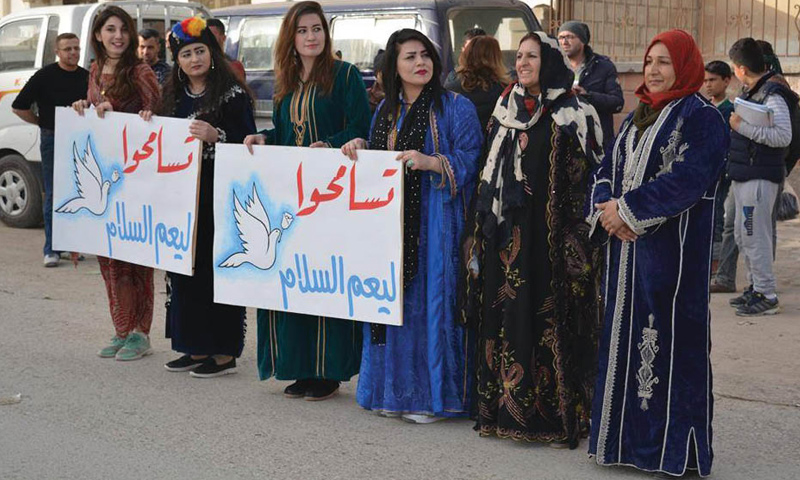



Syrian women have suffered a severe deprivation of political and civil rights, especially under the reign of Ba’ath Party, which played a fundamental role in the marginalization of women, the suppression of their voices and terminating their activities, let them be social or political, unless they served its interests, despite the fact that the Syrian regime have always promoted itself as a secular system that give women their rights.
The Syrian regime has always played a role in burying all the attempts that sought to enlighten women and inform them of their rights and duties, according to Laila Khalaf, the Director of “PÊL” (Civil Waves ) Organization, specialized in the empowerment of women in the governorate of al-Hasakah, in addition to enacting rules that situate the woman in a secondary position which place her under the authority of man, regardless of her social positioning and degree of awareness, according to the Civil Engineer Hassan Shoaib.
These rules and regulations are backed with eastern social traditions, which affected the absence of women’s role in society, for it is a patriarchal society that suppresses the woman’s aspiration in terms of governance and self-determination.
Laila Khalaf confirmed to Enab Baladi that women have worked in various fields, suffered a lot to realize themselves and made a lot of sacrifices. However, they failed to realize their aspirations in relation to leadership.
Maria Abbas, a feminist activist in the international “IRC” program, confirmed the same to Enab Baladi, saying that despite the fact that Syria was among the first countries to give the women the right to vote, “unfortunately, their representation remained shy in the ministries, the councils’ management, conferences and commissions. This reality does not comply with the woman’s struggle and participation in the vents which Syria has witnessed”.
Abbas attributed this to the different obstacles that face women in their way to proving themselves, on top of which are intentional exclusion and the socially-imposed marginalization, that still exist in the current revolutionary phase. In addition to this, there are compelling regulations, which envelope women’s lives and prevent them from achieving gender equality; regulations that hinder them from reaching positions and leadership structures, as well as the social heritage that has been enriched with militarization, extremism and religious powers coming into authority, which limited its role to relief action and the household.
Engineer Hassan Shoaib blamed the current governments for women’s absence from the political and civil scene, considering them as “fake governments that used women as frontiers.”
After the break out of the Syrian revolution, there were many humanitarian organizations that addressed women and their problems; however, they limited their actions to psychological support, according to the civil activist Zainab Al Sayed.
Al-Sayed added: “The Syrian woman struggled and proved herself after the revolution; the evidence to this is that she is working in organizations and is making a serious effort to develop herself. However, this did not give her an access to social or political leadership, as she was not supported or empowered. Most of the women and civil organizations offer a woman only knitting or psychological support,” and assured that, “A woman needs massive social care, in addition to civil and legal education that would help her reach leadership”.
Nevertheless, many factors have curbed the humanitarian organizations, according to the feminist activist Maria Abbas, who pointed out to issues including the required licenses and the funding entities that play a role in directing these organizations according to certain ideologies, in addition to the security situation in Syria and many organizations’ retreat and giving up work due to emigration, bloodshed and multiple threats that prevented them from getting enough support.
Laila Khalaph considers that the solution lies in supporting the limited work of organizations, as they do not have the capabilities needed to help women and to empower them to achieve the participatory community role they dream of, in addition to the necessity to win men’s support and the work to enhance women’s abilities through educational and development campaigns and advocacy.
In her turn, Abbas recommended that women’s organizations work harder to support and empower women and to raise their awareness politically and administratively, as well as to get them out of their neutral role, focusing on social changes and emphasizing the importance of including men advocators in these organizations and gaining support for advocacy.
if you think the article contain wrong information or you have additional details Send Correction